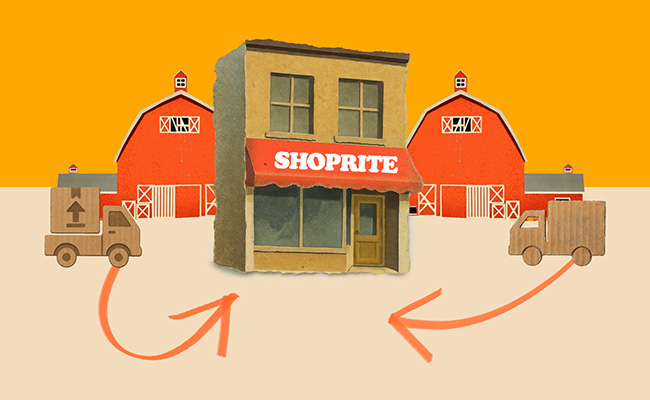Is the Shoprite board onto something? Are the large western multinational fast-moving consumer goods (FMCG) companies losing interest in South Africa? Or is it just that Shoprite is growing too fast for any company – local or international – to keep up with it?
At its recent AGM Shoprite CEO Pieter Engelbrecht told shareholders it has taken 11 weeks to build up the stocks required for its Black Friday campaign and that, generally, the group was forced to carry more stock than it would like in order to avoid stock-outs.
In fact, said chair Wendy Lucas-Bull, Shoprite was only receiving 85% of its stock demand.
These comments were in response to a shareholder’s question about the viability of spending R26.8bn developing Black-owned suppliers in the context of Shoprite “struggling with supplier consistency”.
“It’s not our small suppliers,” replied Engelbrecht, “it’s the big multinationals [MNCs]. They’re not investing in South Africa and we’re all paying the price.”
The group was concerned about it, said Lucas-Bull. “Piet and his team have been very focused on building a pipeline of alternatives locally and we’ve had some successes.”
One of the most notable is Lovies, the disposable nappies manufacturer which, thanks to a partnership with Shoprite, has been built into a large business. There’s more in the pipeline, but it’s a long process.
According to Engelbrecht the supply issues with the large MNCs is not a new problem. “I’ve been saying this for the last 10 years.” That’s a fact any analyst who has attended Shoprite’s results presentation will acknowledge.
When big is too big
But some of those analysts say the problem isn’t so much supply but supply at Shoprite’s price. They also point to the issue of scale; as Engelbrecht highlighted at the AGM: “Our closest competitor is half our size.”
These are points acknowledged by Lucas-Bull in an interview with Currency after the meeting. “Yes, we’re a large and tough negotiator but we have the data and know what the [suppliers’] input costs are.” The implication being it doesn’t serve Shoprite’s interests to squeeze suppliers so hard they stop supplying.
She is adamant the issue is that there have not been adequate levels of capital expenditure by multinational suppliers for some time.
This aversion to investing in South Africa seems a far cry from the heady days of the rush into Africa, when MNCs seemed desperate to get a slice of the continent at any price. Walmart’s outrageously generous price for Massmart and AB InBev’s over-the-top offer for SABMiller are the two most obvious examples of that Africa-optimism rush. And two good reasons why it might have been ill-considered.
There have been a few recently – Heineken’s joint offer for Distell – but certainly the excitement has died down. It’s died down to such an extent that now these MNCs can barely muster the enthusiasm to keep investment ticking over.
In part, it’s down to a change in corporate management behaviour that has little to do with Africa. As one analyst tells Currency, there’s been a financialisation of global investment. The focus is no longer on building markets for the long term but in generating short-term returns for shareholders. “MNCs are not here to build businesses, they want to return money to the home base,” he says.
Lucas-Bull agrees: “The multinationals are under pressure globally to generate dollar returns.”
Intriguingly, this skittishness with financialisation and long-term commitment seems largely a European and US MNC issue. Instead, Asian and Middle Eastern companies have been large asset purchasers in recent years. Dubai-based DP World finalised its purchase of Imperial Holdings in 2022. Saudi-based Zahid group is in the process of wrapping up the Barloworld purchase. And Indian company Natco Pharma is now the joint owner of Adcock Ingram. At the same time Chinese companies are slowly taking over the local motor manufacturing industry.
None of three of the largest multinational FMCG groups in South Africa (Procter & Gamble, Unilever and Nestlé) responded to requests for comment on Shoprite’s supply woes. As for their capex commitments, an AI dig generated unimpressive results: an occasional R200m here and R300m there, spread over the past decade.
Things were a little more impressive on the home front. AVI spent a smidgen over R600m on capex in 2025 and in financial 2024 Tiger Brands’ capex bill was R970m.
But these figures are dwarfed by the money Africa’s largest retailer spends every year on growing its business. In financial 2025 Shoprite’s capex was a staggering R8bn – a slight increase on the R7.8bn spent in 2024.
Perhaps a more insightful way of viewing Shoprite’s passion for long-term growth is to compare the capex figure with money handed back to shareholders. It paid out R4bn in dividends in 2025 and also returned R1bn to shareholders through share repurchases.
Cash into the business
So, it’s spending considerably more growing the business than repaying shareholders, which is just how you’d think things should be in a flourishing enterprise. Yet it’s remarkably uncommon.
Consider that in its results presentation for the June 2025 results, AVI boasted it had returned R5bn to shareholders over the previous two years. That’s considerably more than it spent growing the business.
And at Tiger Brands the money paid out to shareholders was more than double what was spent on capex in 2024 with R1.6bn in dividends and a further R215.5m in share repurchases.
So, the profits aren’t just sitting idly on balance sheets, they’re being pumped back to shareholders.
But it isn’t all about financialisation.
No doubt a focus on generating short-term returns for shareholders is a big part of Shoprite’s supply woes but, let’s face it, there’s no shortage of factors encouraging companies to hold back on investing.
These include barely discernible growth, crumbling infrastructure, a generally inept government as well as a fragile and complex social fabric – and each one on its own provides sufficient reason to trim capex.
Given all the reasons not to invest, in a world dominated by febrile short-term-focused money managers, the wonder is that some companies are determined to plough ahead in search of growth opportunities.
Top image: Rawpixel/Currency collage.
Sign up to Currency’s weekly newsletters to receive your own bulletin of weekday news and weekend treats. Register here.












